八年级英语上册一般将来时态
人教版八年级上册英语第7课知识点教师版
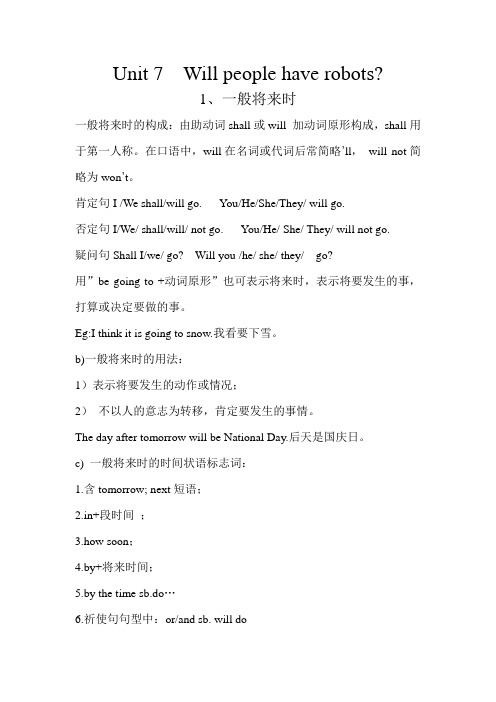
Unit 7 Will people have robots?1、一般将来时一般将来时的构成:由助动词shall或will 加动词原形构成,shall用于第一人称。
在口语中,will在名词或代词后常简略’ll,will not简略为won’t。
肯定句I /We shall/will go. You/He/She/They/ will go.否定句I/We/ shall/will/ not go. You/He/ She/ They/ will not go.疑问句Shall I/we/ go? Will you /he/ she/ they/ go?用”be going to +动词原形”也可表示将来时,表示将要发生的事,打算或决定要做的事。
Eg:I think it is going to snow.我看要下雪。
b)一般将来时的用法:1)表示将要发生的动作或情况;2)不以人的意志为转移,肯定要发生的事情。
The day after tomorrow will be National Day.后天是国庆日。
c) 一般将来时的时间状语标志词:1.含tomorrow; next短语;2.in+段时间;3.how soon;4.by+将来时间;5.by the time sb.do…6.祈使句句型中:or/and sb. will do7.在时间/条件状语从句中, 如果从句用一般现在时, 主句用将来时8.another dayin 与after的区别in是指以现在时间为起点的“在一段时间以后”。
也可以表示“在将来多少时间之内”,句子中的谓语动词要用一般将来时态;after常指以过去时间为起点的“一段时间之后”,所以它与过去时态连用。
当after指某个特定的未来时刻或日期之后,或指以将来某一时间为起点的若干时间之后时,它可以与将来时态连用。
例句:I'll be back in half an hour. 我半小时后就回来. 本句中的in 作"以后"解,不能用after代替。
人教版八年级英语上册Unit6知识归纳

一.单元语法聚焦:一般将来时:表示将要发生的动作或状态及打算、计划准备要做饿事情,常与表示将来的时间状语连用。
㈠肯定结构:1.主语+be动词+going to+do动词原形(be动词要与主语人称保持一致)I (am) ,you/ we/ they (are), she/ he / it (is)2.主语+will + do动词原形Jim is going to play football.Jim will play football.㈡否定结构:be not going to do / will not (won’t) do㈢标志词:1.this+时间(this morning, this afternoon, this evening, this weekend…)2.next +时间(next weekend, next week, next year…) 3.Tomorrow, tonight, the day after tomorrow..㈣be going to 的用法:⑴be going to do sth 表示将来的打算、计划或安排。
⑵常与表示将来的tomorrow, next year等时间状语或when 引导的时间状语从句连用。
when引导的从句用一般现在时态。
⑶各种句式变换,句式变换借助be 动词完成,be随主语有am, is, are 的变换。
①肯定句:主语+ be going to + 动词原形+ 其他He is going to take the bus there when he is free.②否定句:主语+ be not going to + 动词原形+ 其他I’m not going to see my friends this weekend.③一般疑问句:Be +主语+ going to +动词原形+其他肯定回答:Yes, 主语+ be.否定回答:No, 主语+ be not.—Are you going to see your friends this weekend? —Yes ,I am. / No, I’m not.④特殊疑问句:疑问词+ be +主语+ going to +动词原形+其他?What is he going to do this weekend?When are you going to see your friends?⑷如果表示计划去某地,可直接用be going to+地点We are going to Beijing for a holiday..⑸表示位置移动的动词,如go , come, leave ,move等常用进行时表示将来时态表示近期打算做某事。
Unit6Period1Grammar一般将来时(课件)-八年级英语上册(牛津上海版)
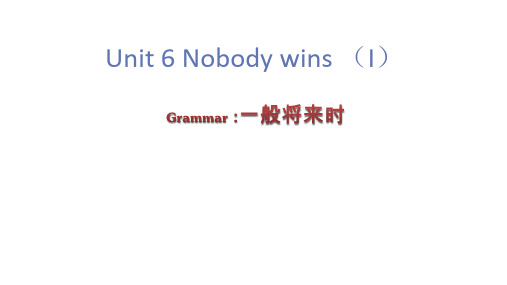
考点四
will与be going to区别
My father is going to visit Australia next year.
be going to 计划,打算做某事。
He will write a book one day.
will单纯的表将来。
Look at those clouds! It is going to rain.
考查宾语从句。根据“I hope the new round of Israeli-Palestinian conflict (巴以冲突)...soon.”可知,“the new round of Israeli-Palestinian conflict (巴以冲突)...soon”是宾语从句,而主句是一般现在时,结合soon,此时 宾语从句应用一般将来时,谓语结构是will do。故选B。 24.B 【详解】句意:——你为什么这么着急,迈克?——十分钟后电视将播放一场世界杯足球赛。 考查时态。根据“There”和“in ten minutes”可知本句为there be句型的一般将来时,结构为there will be或There is/are going to be;主语是a World Cup football match,be动词用is,故选B。 25.D 【详解】句意:将会有一部精彩的电影。我很期待看到它。
be going to 表示现在已经有迹象表明将要发生。
She will be 12 years old next year.
will表示客观上将来势必发生的事情。
21.Don’t worry, Jim. In a week, the baby ________ move freely.
考点一
人教版八年级英语上册Unit7知识点讲解
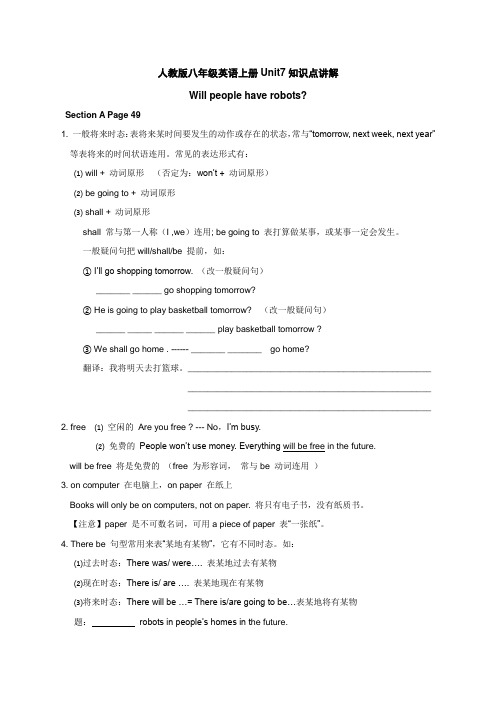
人教版八年级英语上册Unit7知识点讲解Will people have robots?Section A Page 491. 一般将来时态:表将来某时间要发生的动作或存在的状态,常与“tomorrow, next week, next year”等表将来的时间状语连用。
常见的表达形式有:⑴ will + 动词原形(否定为:won’t + 动词原形)⑵ be going to + 动词原形⑶ shall + 动词原形shall 常与第一人称(I ,we)连用; be going to 表打算做某事,或某事一定会发生。
一般疑问句把will/shall/be 提前,如:① I’ll go shopping tomorrow. (改一般疑问句)_______ ______ go shopping tomorrow?② He is going to play basketball tomorrow? (改一般疑问句)______ _____ ______ ______ play basketball tomorrow ?③ We shall go home . ------ _______ _______ go home?翻译:我将明天去打篮球。
______________________________________________________________________________________________________________________________________________________2. free ⑴空闲的Are you free ? --- No,I’m busy.⑵免费的People won’t use money. Everything will be free in the future.will be free 将是免费的(free 为形容词,常与be 动词连用)3. on computer 在电脑上,on paper 在纸上Books will only be on computers, not on paper. 将只有电子书,没有纸质书。
人教版八年级上册英语知识点总结
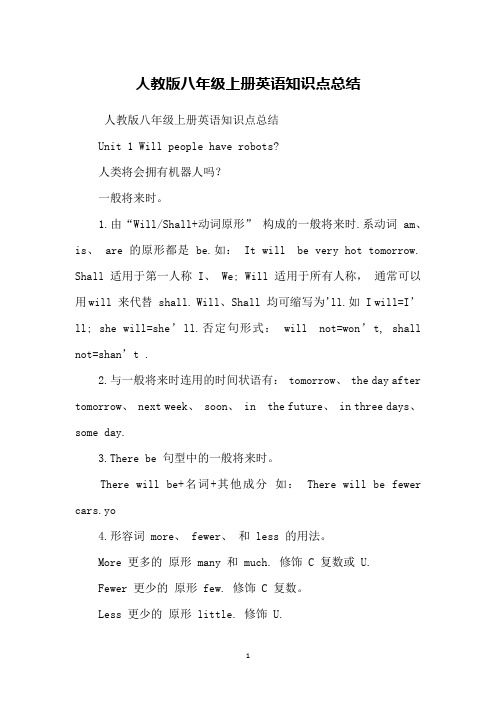
人教版八年级上册英语知识点总结人教版八年级上册英语知识点总结Unit 1 Will people have robots?人类将会拥有机器人吗?一般将来时。
1.由“Will/Shall+动词原形”构成的一般将来时.系动词 am、is、 are 的原形都是 be.如: It will be very hot tomorrow. Shall 适用于第一人称 I、 We; Will 适用于所有人称,通常可以用will 来代替 shall. Will、 Shall 均可缩写为’ll.如 I will=I’ll; she will=she’ll.否定句形式: will not=won’t, shall not=shan’t .2.与一般将来时连用的时间状语有: tomorrow、 the day after tomorrow、 next week、 soon、 in the future、 in three days、some day.3.There be 句型中的一般将来时。
There will be+名词+其他成分如: There will be fewer cars.yo4.形容词 more、 fewer、和 less 的用法。
More 更多的原形 many 和 much. 修饰 C 复数或 U.Fewer 更少的原形 few. 修饰 C 复数。
Less 更少的原形 little. 修饰 U.Unit2 What should I do?我应该做什么?1.情态动词 should.Should 和 can、 may、 must 等情态动词一样,无人称和数的变化,后接动词原形,能独立构成疑问句和否定句。
如: Who should pay the taxes? You shouldn’t play football in the street.2.情态动词 could.单独的情态动词,表“能,可以”。
用来提供建议,后跟动词原形.它和 should 都用来提供建议。
八年级上册英语语法知识点总结
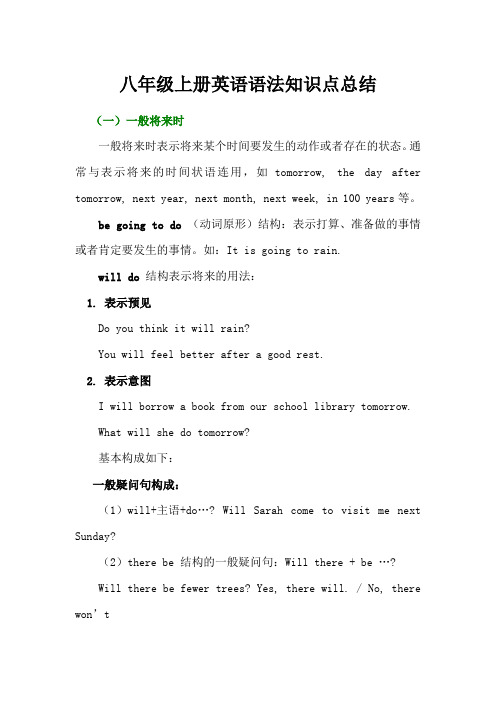
八年级上册英语语法知识点总结(一)一般将来时一般将来时表示将来某个时间要发生的动作或者存在的状态。
通常与表示将来的时间状语连用,如tomorrow, the day after tomorrow, next year, next month, next week, in 100 years等。
be going to do(动词原形)结构:表示打算、准备做的事情或者肯定要发生的事情。
如:It is going to rain.will do结构表示将来的用法:1. 表示预见Do you think it will rain?You will feel better after a good rest.2. 表示意图I will borrow a book from our school library tomorrow. What will she do tomorrow?基本构成如下:一般疑问句构成:(1)will+主语+do…? Will Sarah come to visit me next Sunday?(2)there be 结构的一般疑问句:Will there + be …?Will there be fewer trees? Yes, there will. / No, there won’t否定句构成:will + not (won’t)+doSarah won’t come to visit me next Sunday.特殊疑问句构成:特殊疑问词+will+主语+…?What will Sarah do next Sunday?练一练根据例句,用will改写下列各句例:I don’t feel well today. (be better tomorrow)I’ll be better tomorrow.1. Gina has six classes today. (have a lot of homework tonight)_____________________________2. I’m tired now. (sleep later)_____________________________3. My parents need a new car. (buy one soon)_____________________________4. We can’t leave right now. (leave a little later)_____________________________5. The weather is awful today. (be better tomorrow)_____________________________答案:1. She’ll have a lot of homework tonight.2. I’ll sleep later.3. They’ll buy one soon.4. We’ll leave a little later.5. Maybe it’ll be better tomorrow.(二)should的用法:should用来提出建议和忠告,后边加动词原形,否定句直接在should后边加not.例如:I think you should eat less junk food.我认为你应该少吃垃圾食品。
八年级上册英语外研版m6知识点
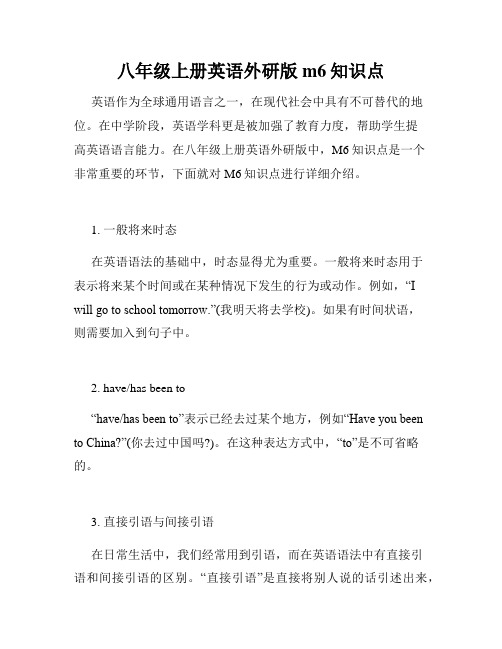
八年级上册英语外研版m6知识点英语作为全球通用语言之一,在现代社会中具有不可替代的地位。
在中学阶段,英语学科更是被加强了教育力度,帮助学生提高英语语言能力。
在八年级上册英语外研版中,M6知识点是一个非常重要的环节,下面就对M6知识点进行详细介绍。
1. 一般将来时态在英语语法的基础中,时态显得尤为重要。
一般将来时态用于表示将来某个时间或在某种情况下发生的行为或动作。
例如,“I will go to school tomorrow.”(我明天将去学校)。
如果有时间状语,则需要加入到句子中。
2. have/has been to“have/has been to”表示已经去过某个地方,例如“Have you been to China?”(你去过中国吗?)。
在这种表达方式中,“to”是不可省略的。
3. 直接引语与间接引语在日常生活中,我们经常用到引语,而在英语语法中有直接引语和间接引语的区别。
“直接引语”是直接将别人说的话引述出来,并用引号把他们的原话包含在内。
“间接引语”则是把别人说的话转化成自己的话,不再用引号表示。
例如,-Direct speech: “I love English,” she said.-Indirect speech: She said that she loved English.4. must, should和ought to的用法must用于表示强制、义务、必须和应该,例如“I must finish my homework before I go to bed.”(我必须在睡觉前完成我的作业)。
should和ought to是表示应该、应当,但没有强制性。
例如“Students should/ought to finish their homework on time.”(学生应该按时完成作业)。
5. 情态动词的疑问句和否定句情态动词主要有can、must、should、may、might、will和shall 等。
八年级英语时态总结
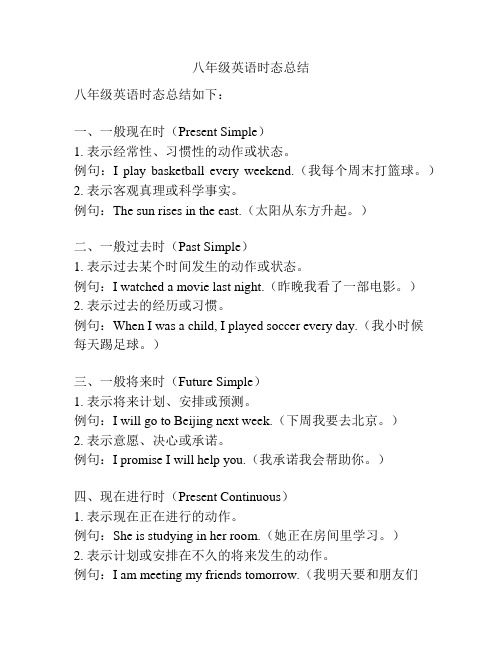
八年级英语时态总结八年级英语时态总结如下:一、一般现在时(Present Simple)1. 表示经常性、习惯性的动作或状态。
例句:I play basketball every weekend.(我每个周末打篮球。
)2. 表示客观真理或科学事实。
例句:The sun rises in the east.(太阳从东方升起。
)二、一般过去时(Past Simple)1. 表示过去某个时间发生的动作或状态。
例句:I watched a movie last night.(昨晚我看了一部电影。
)2. 表示过去的经历或习惯。
例句:When I was a child, I played soccer every day.(我小时候每天踢足球。
)三、一般将来时(Future Simple)1. 表示将来计划、安排或预测。
例句:I will go to Beijing next week.(下周我要去北京。
)2. 表示意愿、决心或承诺。
例句:I promise I will help you.(我承诺我会帮助你。
)四、现在进行时(Present Continuous)1. 表示现在正在进行的动作。
例句:She is studying in her room.(她正在房间里学习。
)2. 表示计划或安排在不久的将来发生的动作。
例句:I am meeting my friends tomorrow.(我明天要和朋友们见面。
)五、过去进行时(Past Continuous)1. 表示过去某一时刻正在进行的动作。
例句:He was reading a book when I entered the room.(我进屋的时候他正在读书。
)2. 表示过去同时发生的两个动作。
例句:I was cooking while he was watching TV.(他在看电视的时候我在做饭。
)六、将来进行时(Future Continuous)表示将来某个时间正在进行的动作。
- 1、下载文档前请自行甄别文档内容的完整性,平台不提供额外的编辑、内容补充、找答案等附加服务。
- 2、"仅部分预览"的文档,不可在线预览部分如存在完整性等问题,可反馈申请退款(可完整预览的文档不适用该条件!)。
- 3、如文档侵犯您的权益,请联系客服反馈,我们会尽快为您处理(人工客服工作时间:9:00-18:30)。
•主语 + shall \ will + 动词原形 + 其他
1、will 用于各种人称,shall 只能用于第一人称, be 随人称和数、时间的变化而变化,will 常省略
3、将来每个人都有一台计算机. Everyone will have a computer in the future.
4、我们将使用因特网在家里学习. We will use the Internet to study at home.
5、我理想的学校将有宽大的教室和图书室。
My dream school will have big classrooms and libraries.
6、学生将在电脑上与老师对话. Students will talk to their teachers on the computers.
7、将来有学校吗?不,没有 Will there be schools in the future? No, there won’t.
谢谢观赏!
1、there be 的将来时态表示 某处 将会有 2、there be 的将来时态的否定句表示 某处 将不 会有
肯定句:There will be +主语+其他
否定句:
There won’t be +主语+其他
疑问句:
疑问词+ Will +there + be + 主语 + 其他?
Yes, there + will
肯定句:主语 + be going to + 动词原形 + 其他
否定句:
主语 + be not g; 其他
疑问句:
疑问词+ Be +主语 +going to + 动词原形 + 其他?
Yes, 主语 + be.
No, 主语 + be not.
•There will be +主语+其他
人教版八年级英语上册语法(2)
一般将来时
人教版新目标 Unit 6 & Unit 7
一般将来时
•含义
表示将来的某个时间或时间段内要发 生的动作或存在的状态,或将来经常、 反复发生的动作。
•常用的时间状语
tomorrow 明天
in the future 在将来
from now on 从今往后 in + 段时间 …之后
疑问句:
疑问词+ Shall \ will +主语 + 动词原形 + 其他?
Yes, 主语 + will
No, 主语 + won’t
•主语 + be going to +动词原形 +其他
1、be going to 用于指某事肯定发生,或表示 某事很快就要发生。 2、be going to 表示计划、打算要做的事情。 will 不用。
No, there + won’t
汉译英:
1、明天,我们学校将有场足球赛,我准备去看. Tomorrow, there will be a football match in our
school. I’m going to watch it. 2、我打算和李明一起上音乐课. I’m going to have music lessons with Li Ming.
为’ll.
2、will \shall + 动词原形,表示单纯意义的将来 要,没有计划性,
3、will 表示说话人相信或希望要发生的事情, 或陈述将来某个事实,或决定将来要做,也表示 说话人的意愿。
肯定句:主语 + shall \ will + 动词原形 + 其他
否定句:
主语 + shall \ will +not + 动词原形 + 其他
next week\ month\ year 下周、月,下一年
this year\ term\ week 今年,这学期,这周
表示一般将来时的三种结构
• 主语 + shall \ will + 动词原形 + 其他 • 主语 + be going to +动词原形 +其他 • There will be +主语+其他 • 主语+ be about to (表示马上要发生)
